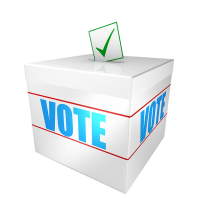Widgetized Section
Go to Admin » Appearance » Widgets » and move Gabfire Widget: Social into that MastheadOverlay zone
Do Voters Make Policy?
The views expressed are those of the author and do not necessarily reflect the views of ASPA as an organization.
By Richard Clay Wilson, Jr.
October 4, 2016
Students of public administration are taught that competing candidates for political office stand for competing policy alternatives. The policy viewpoints and prescriptions of candidates who win stand validated and legitimized. The policy viewpoints and prescriptions of candidates who lose, in contrast, stand rejected. Postelection, it is the job of government’s career administrators to implement the winning policies.
It would be well and good if democracy did work this way. But it doesn’t. Consider two high-profile examples: The Brexit election that just took place in Great Britain and the presidential election that will take place in November 2016.
Does anyone think that the Brexit election constituted anything remotely resembling a “policy” verdict on European Union (EU) membership? Think of the vast and complex policy implications of Brexit. It would require volumes to sum up the historic political and economic pros and cons of 40 years in the EU, much less set forth the pros and cons that might attach to future membership. Scholars well-versed in these matters would have been challenged to identify and define the salient issues, much less render them cognizable to millions of voters.
While the Brexit question was arguably of greater consequence than the upcoming U.S. presidential election, the latter invokes an even wider range of “policy” issues, including just about everything the U.S. government stands for and does. It is doubtful that any two people would agree on a one-page list of what those policy issues are. It is equally doubtful that any two people would perceive the candidates’ respective “policy positions” with regard to those issues in the same way.
It is manifestly clear that elections are not intellectual policy propositions. They are much more about how voters feel than how voters think. It would be a sheer impossibility for millions of voters to coalesce into intellectual policy. Indeed, it would be all but impossible for a room full of scholars to do so. Voters coalesce around common feelings instead.
To observe that elections are about voters’ feelings is not to denigrate voters or elections either one. It is simply to observe what takes place. Of late, the news media have featured a plethora of interviews with voters in Great Britain and the U.S. No two of them have the same thing to say. Each has a highly personal rationale. Election results reveal far more about the people who voted than about intellectual policies those voters might favor.
 The task of politicians who want to obtain a given result from an election is to correctly assess the sum total of the “personal rationales” of those who will vote and persuade a majority to vote for the desired result. In the aftermath of victory, winning paths are always clear, but they aren’t so clear beforehand. What is clear is that the practice of politics is a practice of voter assessment and response. When voters are largely content, for example, candidates can offer measures reflective of contentment, but when voters are discontented, candidates must share their consternation and offer measures reflective of discontent. Voters, not candidates, determine the mood and course of election campaigns.
The task of politicians who want to obtain a given result from an election is to correctly assess the sum total of the “personal rationales” of those who will vote and persuade a majority to vote for the desired result. In the aftermath of victory, winning paths are always clear, but they aren’t so clear beforehand. What is clear is that the practice of politics is a practice of voter assessment and response. When voters are largely content, for example, candidates can offer measures reflective of contentment, but when voters are discontented, candidates must share their consternation and offer measures reflective of discontent. Voters, not candidates, determine the mood and course of election campaigns.
So it is that the practice of politics is deeply personal. Voters want elections to be about them. Political success demands that politicians capture the moment, election after election. (It also helps, when candidates’ empathies with voters are dubious, to argue that political opponents are even further out of touch!)
Policy issues, which are by definition intellectual, complex and long-term, are both distant from and subordinate to short-term political priorities that animate and decide elections. It is foolishness to regard election results as substantive verdicts on policy. Elections are about voters in the present moment. It is right and proper for government to respond in accordance with election results, but it is utterly wrong to derive long-term policy conclusions from any single election.
Unfortunately, our “public administration” mindset desires and honors intellectual policy but is easily offended by political campaigns and the practice of politics, which it regards as coarse at best and fraudulent at worst. Such a viewpoint expects far more from elections and elected officials than they can possibly deliver. Elections tell us no more and no less than how voters felt on a given day. It honors, not deprecates, democracy to acknowledge this.
In sum, election results are clear in deciding who will hold office but opaque in terms of the policies that institutions of government will promulgate and carry out. Policies of government come from politicians, not voters. If we want policy, we will have to learn to appreciate, not disdain, the political prerequisites.
Author: Richard Clay Wilson, Jr. is a retired city manager with 38 years of local government experience. He is the author of the book Rethinking Public Administration: The Case for Management, Melvin & Leigh, Publishers, Irvine, California, 2016. Mr. Wilson is also a columnist for PA Times magazine and Governing.com.


 (1 votes, average: 4.00 out of 5)
(1 votes, average: 4.00 out of 5)
Follow Us!